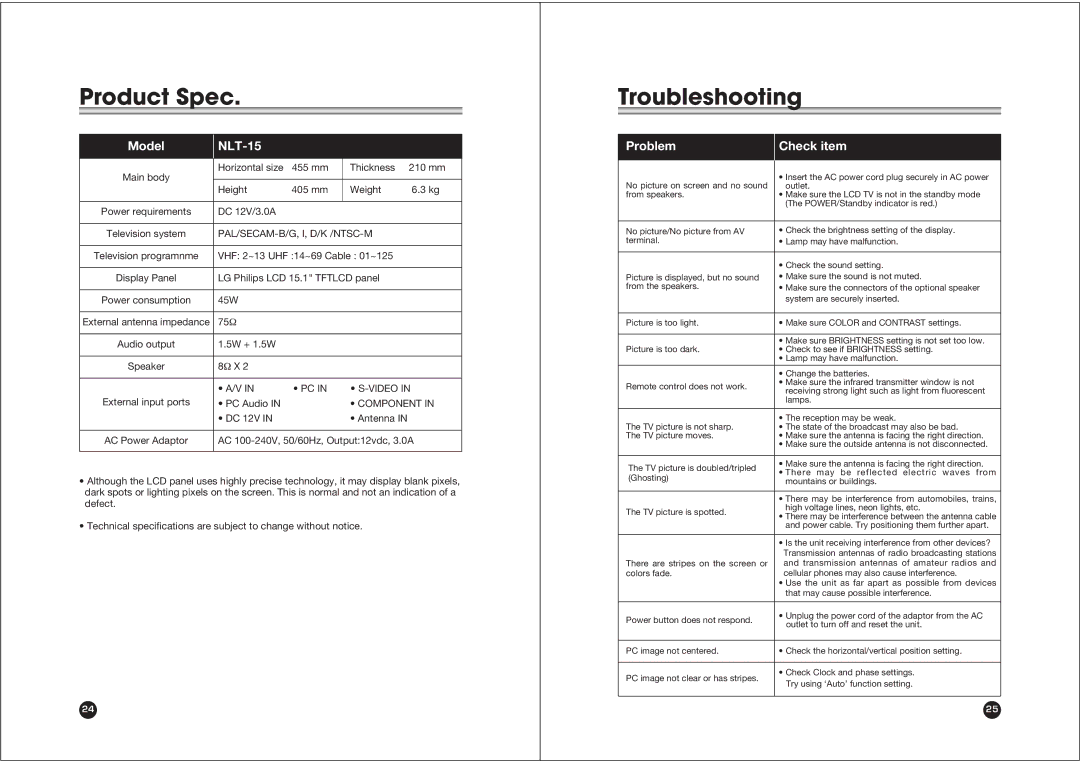
Product Spec.
Model |
|
|
|
| |
|
|
|
|
| |
Main body | Horizontal size | 455 mm | Thickness | 210 mm | |
|
|
|
| ||
Height | 405 mm | Weight | 6.3 kg | ||
| |||||
|
|
|
|
| |
Power requirements | DC 12V/3.0A |
|
|
| |
|
|
|
| ||
Television system |
|
| |||
|
|
|
| ||
Television programnme | VHF: 2~13 UHF :14~69 Cable : 01~125 |
| |||
|
|
|
| ||
Display Panel | LG Philips LCD 15.1" TFTLCD panel |
| |||
|
|
|
|
| |
Power consumption | 45W |
|
|
| |
|
|
|
|
| |
External antenna impedance | 751 |
|
|
| |
|
|
|
|
| |
Audio output | 1.5W + 1.5W |
|
|
| |
|
|
|
|
| |
Speaker | 81 X 2 |
|
|
| |
|
|
|
| ||
| • A/V IN | • PC IN | • | ||
External input ports | • PC Audio IN |
| • COMPONENT IN | ||
| • DC 12V IN |
| • Antenna IN |
| |
|
|
| |||
AC Power Adaptor | AC | ||||
|
|
|
|
| |
•Although the LCD panel uses highly precise technology, it may display blank pixels, dark spots or lighting pixels on the screen. This is normal and not an indication of a defect.
•Technical specifications are subject to change without notice.
24
Troubleshooting
Problem |
| Check item |
No picture on screen and no sound |
| • Insert the AC power cord plug securely in AC power |
| ||
| outlet. | |
from speakers. |
| • Make sure the LCD TV is not in the standby mode |
|
| (The POWER/Standby indicator is red.) |
|
|
|
No picture/No picture from AV |
| • Check the brightness setting of the display. |
terminal. |
| • Lamp may have malfunction. |
|
|
|
|
| • Check the sound setting. |
Picture is displayed, but no sound |
| • Make sure the sound is not muted. |
from the speakers. |
| • Make sure the connectors of the optional speaker |
|
| system are securely inserted. |
|
|
|
Picture is too light. |
| • Make sure COLOR and CONTRAST settings. |
|
|
|
|
| • Make sure BRIGHTNESS setting is not set too low. |
Picture is too dark. |
| • Check to see if BRIGHTNESS setting. |
|
| • Lamp may have malfunction. |
|
| • Change the batteries. |
Remote control does not work. |
| • Make sure the infrared transmitter window is not |
| receiving strong light such as light from fluorescent | |
|
| |
|
| lamps. |
|
|
|
|
| • The reception may be weak. |
The TV picture is not sharp. |
| • The state of the broadcast may also be bad. |
The TV picture moves. |
| • Make sure the antenna is facing the right direction. |
|
| • Make sure the outside antenna is not disconnected. |
|
|
|
The TV picture is doubled/tripled |
| • Make sure the antenna is facing the right direction. |
| • There may be reflected electric waves from | |
(Ghosting) |
| |
| mountains or buildings. | |
|
| |
|
|
|
|
| • There may be interference from automobiles, trains, |
The TV picture is spotted. |
| high voltage lines, neon lights, etc. |
| • There may be interference between the antenna cable | |
|
| |
|
| and power cable. Try positioning them further apart. |
|
|
|
|
| • Is the unit receiving interference from other devices? |
|
| Transmission antennas of radio broadcasting stations |
There are stripes on the screen or |
| and transmission antennas of amateur radios and |
colors fade. |
| cellular phones may also cause interference. |
|
| • Use the unit as far apart as possible from devices |
|
| that may cause possible interference. |
|
|
|
Power button does not respond. |
| • Unplug the power cord of the adaptor from the AC |
| outlet to turn off and reset the unit. | |
|
| |
|
|
|
PC image not centered. |
| • Check the horizontal/vertical position setting. |
|
|
|
PC image not clear or has stripes. |
| • Check Clock and phase settings. |
| Try using ‘Auto’ function setting. | |
|
| |
|
|
|
| 25 | |
